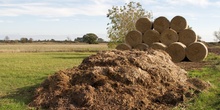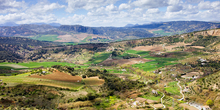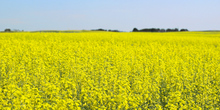Agriculture & Land Management
Our Work
Latest in Agriculture & Land Management
-
Moving the debate on sustainable bioenergy to 2030
On 30th November, the European Commission published a “Winter package” of policy proposals, including for bioenergy in the form of a revised Renewable Energy Directive. Although encouraging to answer the many requests for policy certainty, a number of key questions about the right and most appropriate approach to deliver sustainable bioenergy still remain and need further scrutiny.
-
IEEP sets out new sustainability criteria for biofuels post 2020
Defining effective and workable sustainability criteria for biofuels is one of the critical steps in decarbonising Europe’s energy sector. Such criteria must provide the necessary safeguards for the use of bioresources in Europe, as well as the policy and investment certainty required for sustainable deployment.
-
Sustainability criteria for biofuels post 2020
Defining effective and workable sustainability criteria is one of the critical steps in decarbonising Europe’s energy sector. They must provide the necessary safeguards for the use of bioresources in Europe, as well as the policy and investment certainty required for sustainable deployment.
-
Land suitability assessments for bioenergy feedstocks in the EU – a review of data sources
Current data availability is inadequate to undertake a detailed national or European level study of land areas that are underutilised and could be considered available for bioenergy production within the EU.
-
Assessing sustainable biomass availability
Dr. Ben Allen presented IEEP’s views on the sustainable use of biomass at an international conference in Brussels. Understanding the scale of the resource is a key part of determining appropriate policy intervention and ensuring commercial viability.
-
New report: delivering low carbon transport fuels post 2020
How should EU policy support the transition to low carbon transport fuels post 2020? A new IEEP led report argues that future policies should be differentiated to tailor support towards specific objectives and technologies that offer the greatest potential for a low carbon future.
-
New report is out: delivering low carbon transport fuels post 2020
How should EU policy support the transition to low carbon transport fuels post 2020? A new IEEP led report argues that future policies should be differentiated to tailor support towards specific objectives and technologies that offer the greatest potential for a low carbon future.
-
Conclusion on ILUC in sight
After five years of discussion, a landmark moment has been reached whereby the indirect land use change (ILUC) impacts of biofuels almost certainly will be addressed in EU law.
-
Building a high value bioeconomy in the UK: opportunities from waste
The UK is exploring opportunities to develop a high value bioeconomy based initially on waste. IEEP is helping to identify international best practice examples in order to maximise the environmental and economic benefits of this new Government initiative.
-
Evidence before ideology
The latest edition of IEEP's newsletter is now available. David Baldock argues that in 2015 solid evidence rather than political fashion will be required in scrutinising EU policy and economic performance. Also: fossil fuel subsidies; allocating fishing quota; and the launch of our new training programme.
-
The Manual: Chapter 13 - Sectoral policies
This is a chapter of IEEP’s Manual of European Environmental Policy. This chapter sets out the development of some of the most important links between EU environmental policy and other policy areas, such as agriculture, forestry, fisheries, transport, trade, and so on.
-
Space for energy crops – An assessment on the potential contribution of Europe’s energy future
The overall energy potential that can be produced from growing dedicated energy crops on ‘spare’ land in the EU is low. This new report explores the potential for the additional production of energy crops in Europe on land not already used for food production, forestry, or providing other important services, and assesses some of the challenges associated with increasing output.
-
Press release - Biofuels don’t deliver but bioresources have promise
Biofuels produced from conventional agricultural crops deliver only limited reductions in greenhouse gas emissions (GHG) and compete for limited supplies of land.
-
Re-examining EU biofuels policy: A 2030 perspective
EU biofuel policy must reflect the reality that while biomass in principle can be renewed, the overall quantity sustainably available is finite and must be shared across an emerging bioeconomy.
-
Options for sustainable food and agriculture in the EU
How should Europe respond to the increased demands on our food and agriculture systems arising from global population growth, changing diets, and competing demands on agricultural land? This report offers a view on how the EU could play a role in meeting these challenges in the coming decades and sets out some of the options which merit particular attention.
-
Europe’s role in feeding the world in 2050
IEEP presents views on how Europe should respond to the increased demands on our food and agriculture systems arising from global population growth, changing diets, and competing demands on agricultural land.
-
Ministers place biofuels in a policy vacuum
Energy Ministers today failed to agree reforms to the EU laws that promote the use of biofuels for transport. Current EU legislation is flawed and unfit for the purpose of delivering verifiable greenhouse gas emission reductions from the transport sector.
-
Interactions between climate change and agriculture; and between biodiversity and agriculture in Europe
What should be Europe’s role in feeding the world in 2050? This IEEP report for the European Parliament describes options for increasing the productivity of European agriculture whilst adapting to climate change, reducing emissions, and providing biodiversity and ecosystem service benefits from agriculture.
-
Ecosystem services of boreal mires and peatlands in Finland
Mire ecosystems are well-known for their unique species and habitats of high conservation value and they also provide a range of benefits to our societies and economies. This publication outlines the results of a pioneering project that aimed to identify and valuate ecosystem services provided by pristine mires and managed peatlands in Finland.
-
IEEP’s latest reflections on the European Commission’s proposal to mitigate indirect land use change from biofuels – June 2013
How can we achieve a more sustainable biofuel policy in the EU? What is needed now and what path should policy take beyond 2020? Read the latest IEEP briefing around the ongoing ILUC debate.
Related
-

Debating the Future of The Common Agricultural Policy
The IEEP's platform to share thoughtful commentary and analysis on the future development of European agriculture and rural development policy.
Highlights
-

Sustainability criteria for biofuels post 2020
Defining effective and workable sustainability criteria is one of the critical steps in decarbonising Europe’s energy sector. They must provide the necessary safeguards for the use of bioresources in Europe, as well as the policy and investment certainty required for sustainable deployment.
-

Land suitability assessments for bioenergy feedstocks in the EU – a review of data sources
Current data availability is inadequate to undertake a detailed national or European level study of land areas that are underutilised and could be considered available for bioenergy production within the EU.
-

Re-examining EU biofuels policy: A 2030 perspective
-

Biofuels and ILUC – Q&A
-

Land as an Environmental Resource
-

The Indirect Land Use Change Impact of the Use of Biofuels in the EU
-
The Land-Use Implications of EU Bioenergy Policy: Going Beyond ILUC
